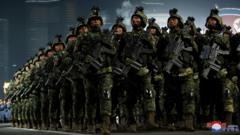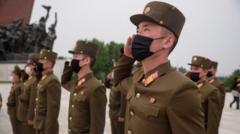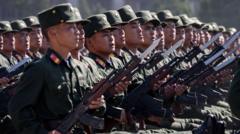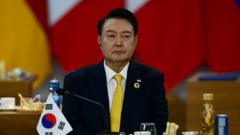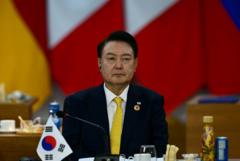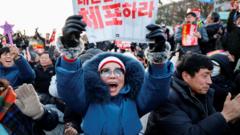In a profound escalation of political tensions, South Korea's President Yoon Suk Yeol recently declared martial law, igniting a political upheaval that could reshape global alliances. For decades, South Korea has been a pivotal ally of the United States, with 30,000 American troops stationed in the country as part of a broader strategy to counter threats from North Korea, China, and Russia. President Biden has publicly celebrated South Korea as a democratic model, highlighted by his choice to host the first non-U.S. Summit for Democracy there and the state dinner for Yoon last year, reinforcing military and diplomatic ties.
Martial Law in South Korea: A Crucial Test for U.S. Relations

Martial Law in South Korea: A Crucial Test for U.S. Relations
As martial law is declared in South Korea, implications grow for the Biden administration and the U.S.-South Korean alliance facing unprecedented challenges.
The sudden decision by President Yoon, rooted in allegations against the opposition party collaborating with North Korea, has presented a daunting challenge for the Biden administration, which has framed its foreign policy around the struggle between democratic ideals and authoritarian government. The declaration of martial law, executed without prior notification to U.S. officials, raises pressing questions about the future of U.S.-ROK relations. The White House responded quickly, expressing concern over the political climate in South Korea and clarifying its commitment to the alliance amidst rising uncertainty.
Speculation looms over the timing of Yoon’s actions, coinciding with a potentially volatile transition in U.S. leadership and his own declining popularity at home. Critics in Washington are drawing parallels between Yoon's aggressive stance against opposition forces and former President Trump’s attempts to challenge the legitimacy of Biden's election. Amidst these developments, U.S. Secretary of State Kurt Campbell reiterated the steadfast nature of the U.S.-South Korean alliance, indicating a commitment to support Seoul during this tumultuous period.
As the Biden administration navigates this complex diplomatic landscape, it faces a critical choice: affirm its commitment to a key ally while upholding the democratic values it champions on the global stage. The unfolding situation in South Korea not only tests the resilience of U.S. alliances but also the principles that guide American foreign policy in a world increasingly divided by authoritarianism and democracy.
Speculation looms over the timing of Yoon’s actions, coinciding with a potentially volatile transition in U.S. leadership and his own declining popularity at home. Critics in Washington are drawing parallels between Yoon's aggressive stance against opposition forces and former President Trump’s attempts to challenge the legitimacy of Biden's election. Amidst these developments, U.S. Secretary of State Kurt Campbell reiterated the steadfast nature of the U.S.-South Korean alliance, indicating a commitment to support Seoul during this tumultuous period.
As the Biden administration navigates this complex diplomatic landscape, it faces a critical choice: affirm its commitment to a key ally while upholding the democratic values it champions on the global stage. The unfolding situation in South Korea not only tests the resilience of U.S. alliances but also the principles that guide American foreign policy in a world increasingly divided by authoritarianism and democracy.


